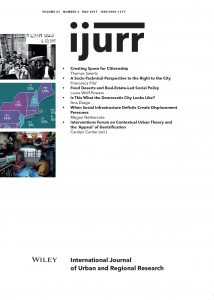Volume 41 Issue 3 May 2017
In This Issue...
Cities are messy, noisy, and vital. Intersecting skeins of socio-spatial complexity enable a multiplicity of identities and interpretations. Irony is no less significant in the cultural realm where difference can become strength. The resurgent role of cities as safe havens is only the latest iteration in a historical impulse that spans the pre-modern, the modern, and whatever we choose to term the current epoch. The urban process exposes boundaries between activism and citizenship that are contested and unstable. Specific interventions can generate new alliances or reveal hitherto unnoticed webs of interconnection. As new fields of contention come into focus within the pages of IJURR such as food deserts, educational inequalities, and novel historiographies of past struggles, our body of knowledge about urban change is further embellished, bringing established and emerging scholars into sustained and productive dialogue. Some established debates continue to bubble up unexpectedly to produce new controversies and uncertainties. Conceptual shibboleths such as gentrification are beginning to fracture: can any single idea really encompass so many dimensions to global urban change? Can we build more nuanced vocabularies to do justice to the richness and complexity of urban life? If we strive to de-centre Anglo-American intellectual discourse can we generate new debates that lie closer to the global textures of urbanization? How can the myriad of other urban worlds, both human and more-than-human, be brought to our attention?
–Matthew Gandy
Articles
Creating Space For Citizenship: The Liminal Politics of Undocumented Activism
Published online on Jun 16th, 2017 | DOI: 10.1111/1468-2427.12480 (p 379-395)
A Socio-Technical Perspective To The Right To The City: Regularizing Electricity Access in Rio de Janeiro’s Favelas
Published online on Jun 16th, 2017 | DOI: 10.1111/1468-2427.12489 (p 396-413)
Food Deserts and Real-Estate-Led Social Policy
Published online on Aug 14th, 2017 | DOI: 10.1111/1468-2427.12515 (p 414-425)
Is This What a Democratic City Looks Like? Local Democracy, Housing Rights and Homeownership in the Portuguese Context
Published online on Sep 12th, 2017 | DOI: 10.1111/1468-2427.12491 (p 426-442)
When Social Infrastructure Deficits Create Displacement Pressures: Inner City Schools and the Suburbanization of Families in Melbourne
Published online on Jun 16th, 2017 | DOI: 10.1111/1468-2427.12509 (p 443-463)
Interventions
Preface to an Interventions Forum on Contextual Urban Theory and The ‘Appeal’ of Gentrification
Published online on Aug 21st, 2017 | DOI: 10.1111/1468-2427.12499 (p 464-465)
Contextual Urban Theory and the ‘Appeal’ of Gentrification: Lost in Transposition?
Published online on Aug 21st, 2017 | DOI: 10.1111/1468-2427.12498 (p 466-477)
Beneath the Appearance of Gentrification: Probing Local Complexities
Published online on Aug 21st, 2017 | DOI: 10.1111/1468-2427.12497 (p 478-486)
Beyond Gentrification: Hegemonic Redevelopment in Hong Kong
Published online on Aug 21st, 2017 | DOI: 10.1111/1468-2427.12496 (p 487-499)
Institutionalization of ‘The Property Mind’
Published online on Aug 21st, 2017 | DOI: 10.1111/1468-2427.12495 (p 500-507)
Gentrifying China’s Urbanization? Why Culture and Capital Aren’t Enough
Published online on Aug 21st, 2017 | DOI: 10.1111/1468-2427.12494 (p 508-517)
Ain’t Talkin’ ‘Bout Gentrification: The Erasure of Alternative Idioms of Displacement Resulting from Anglo-American Academic Hegemony
Published online on Aug 21st, 2017 | DOI: 10.1111/1468-2427.12493 (p 518-525)
Book Reviews
Rebecca Neaera Abers and Margaret E. Keck 2013: Practical Authority: Agency and Institutional Change in Brazilian Water Politics. New York: Oxford University Press Lisa Björkman 2015: Pipe Politics, Contested Waters: Embedded Infrastructures of Millennial Mumbai. Durham, NC and London: Duke University Press
Published online on Sep 12th, 2017 | DOI: 10.1111/1468-2427.12501 (p 526-528)
Rivke Jaffe 2016: Concrete Jungles: Urban Pollution and the Politics of Difference in the Caribbean. New York: Oxford University Press
Published online on Sep 12th, 2017 | DOI: 10.1111/1468-2427.12502 (p 528-530)
Chiara Tornaghi and Sabine Knierbein 2014: Public Space and Relational Perspectives: New Challenges for Architecture and Planning. London: Routledge
Published online on Sep 12th, 2017 | DOI: 10.1111/1468-2427.12503 (p 530-531)
Faranak Miraftab 2016: Global Heartland: Displaced Labor, Transnational Lives and Local Placemaking. Bloomington and Indianapolis: Indiana University Press
Published online on Sep 12th, 2017 | DOI: 10.1111/1468-2427.12504 (p 532-533)
Brian J. McCabe 2016: No Place Like Home: Wealth, Community and the Politics of Homeownership. New York: Oxford University Press
Published online on Sep 12th, 2017 | DOI: 10.1111/1468-2427.12505 (p 533-535)
Eduardo Marques (ed.) 2016: São Paulo in the Twenty-First Century: Spaces, Heterogeneities, Inequalities. New York and London: Routledge
Published online on Sep 12th, 2017 | DOI: 10.1111/1468-2427.12506 (p 535-537)
Kristin V. Monroe 2016: The Insecure City: Space, Power, and Mobility in Beirut. New Brunswick, NJ: Rutgers University Press
Published online on Sep 12th, 2017 | DOI: 10.1111/1468-2427.12507 (p 537-539)
Erik Harms 2016: Luxury and Rubble: Civility and Dispossession in the New Saigon. Berkeley: University of California Press
Published online on Sep 12th, 2017 | DOI: 10.1111/1468-2427.12508 (p 539-540)
Issues in this volume
January 2017
March 2017
May 2017
July 2017
September 2017
November 2017

